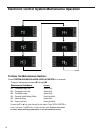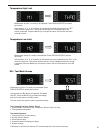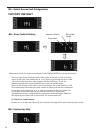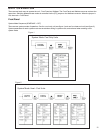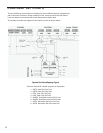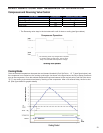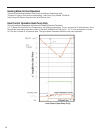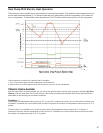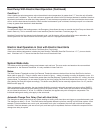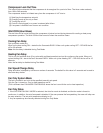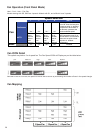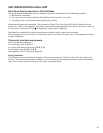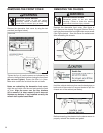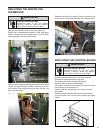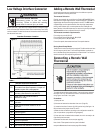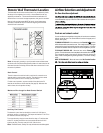
26
Condition 2
If the Δ (delta) (set point temperature minus the ambient indoor temperature) is greater than 5 ˚F, then the unit will switch
to electric heat, if available. The unit will continue to operate with electric heat until the heat demand is satisfi ed. Note that
the electric heat switches on after the Δ temp passes 5°F and the heat pump switches off. Also note that the electric heat
will run until the heat demand is satisfi ed. When another heat demand cycle is initiated, the heat pump will run unless the
Δ temp is greater than the electric heat threshold.
Emergency Heat
If a compressor fails in the heating season, the Emergency Heat allows the user to override the Heat Pump and heat with
electric heat only. This is controlled via the user interface (See the User Menu Functions page 12).
Note that if heat is the fi rst demand cycle (demand cycle = call for heat or call for cooling) after power restoration, the
control system will run electric heat for the entire cycle if the unit is equipped with electric heat.
Electric Heat Operation in Cool with Electric Heat Units
When in the Heat mode, with and without Fan Mode Auto (Fan cycling):
If the indoor ambient temperature is below the Heat Demand Threshold (Heat Set Point minus 1.5 ˚F), turn on electric
heat. If Ambient is 0.3 ˚F above the Heat Set Point turn off the electric heat.
System Mode Auto
This mode provides automatic change over between cool and heat. The auto mode runs based on the room ambient
temperature vs. the Demand Thresholds. It is only available in Heat-Cool Unit.
Notes:
The Heat Demand Threshold and the Cool Demand Threshold values are derived from the Auto Set Point in the Auto
Mode (refer to page 22). There is a buffer zone as shown in fi gure , where no heating or cooling is allowed to occur. It is
critical that the Cool Demand Threshold be greater than the Heat Demand Threshold by a minimum of 3° while in the Auto
System Mode. For example, if a user enters a value for the Auto Cooling Set Point that violates the minimum Δ 3° rule, the
Auto Heating Set Point will adjust accordingly. This buffer zone (BAND) can be manually adjusted from 3 to 10° (see the
BAND section page 13).
When programming the schedule, the user has the fl exibility to enter the schedule automatic set point cooling (SASPC)
and the schedule automatic set point heating (SSPH) set points directly. These values are monitored to ensure that they
do not violate the minimum 3° Δ rule. If a violation is detected, the opposite set point will adjust to compensate. The
individual heating and cooling rules apply to the auto mode.
Automatic Change Over Delay (Cool with Heat Units)
The change over delay ensures that any system heating or cooling over shoot does not trigger an opposite demand cycle.
The change over delay = 15 min. This timer blocks the opposite demand cycle from running until the timer expires. As an
example, if the last demand was a cool cycle, and another cool cycle is requested, the timer will not block the request.
However, if the last demand cycle was a cool cycle, and heat cycle is requested, the timer will block the request until the
change over delay is expired.
Heat Pump With Electric Heat Operation (Continued)



